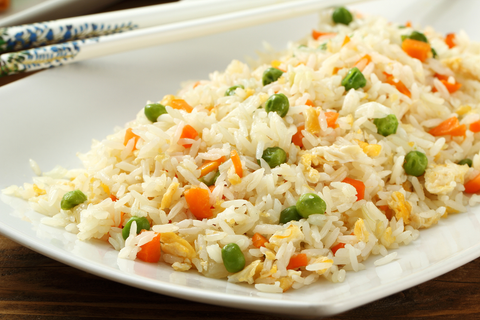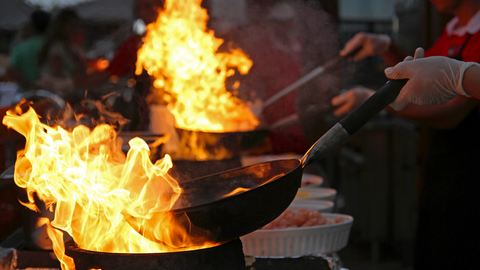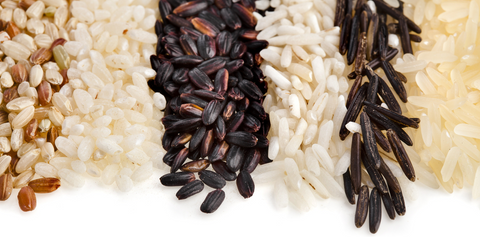Your Cart is Empty
Does Rice Make You Gain Weight?

Rice has been around for at least 4500 years, according to the earliest documented texts. Since then, it has expanded from Asia to a worldwide presence as, arguably, one of the most versatile and most consumed grains in the market - as proof of this, in 2017/18 the world's population has consumed 480.49 metric tons of rice.[1]
We consider it as such a staple carb for several reasons: it's cheap, diverse, delicious, easy to make, and goes perfectly with all kinds of protein, as both a side dish and a main dish - in other words, rice is dependable. However, if you are one of the millions of people around the world who struggles to lose weight, you have probably asked yourself this one question already: does rice make you gain weight?

Well, it's not that simple as to say yes or no. First, there are some things you must understand about rice - let's begin asking what. Rice is a cereal grain, containing the endosperm, the germ, the bran, and the hull - all of these parts are edible, except for the last one. Remove all of the outer layers, and the result is a refined grain known as white rice, usually enriched with vitamins to make up for all of the lost (and valuable) nutrients. However, if you take just the hull out, then you get whole-grain rice - a much healthier alternative. Now back to the point: is rice fattening?
Reasons Why White Rice Makes You Gain Weight
Simply put, it doesn't matter how you cook it (whether steamed, fried, or else how) but what you're cooking. So, let's rephrase our question: is white rice bad for you? Long story short, white rice makes you fatter, but we will show you exactly why and how.
1. White Rice Has No Dietary Fiber Content
A serving of about 100 grams (3.6 ounces in imperial units) of cooked white rice has 0 grams of dietary fiber. You read that right, zero. But why is this relevant? According to this 2010 study in Nutrients Journal, scientists have linked a regular intake of dietary fiber to the prevention of obesity, type-2 diabetes, cancer, and even cardiovascular diseases.[2]

Technically, we can consider dietary fiber as nutrients which the small intestine finds more difficult to absorb and break down for digestion. What this means is that the higher the fiber content, the longer it takes us to digest. Since cooked white rice has none, we absorb it in no time - telling our bodies it's time for more.
2. White Rice Is High In Carbohydrates
Carbs are one of the three essential macronutrients, the other two being fats and proteins. And no, we're not waging war on carbs, since they're not the enemy here. However, we must understand them better and their connection to weight gain.
How many carbs are in rice? A 100g-serving of cooked white rice contains 29 grams of what we call refined carbs which, according to this 2012 study led by food and environmental scientist Mikael Fogelholm, are also connected to both obesity and weight gain. The authors have concluded that during the trial, the more refined carbs a person ate, the more likely it was for them to gain weight.[3] Other examples of refined carbs included white bread, tortillas, corn flakes, granola bars, baked goods, pastries, and pasta.
3. White Rice Is High In Glycemic Index
The ratio of how quickly something can increase your blood sugar levels is called glycemic index (GI). A study led by researcher Jenkins from University of Toronto links both weight gain and overeating to a diet rich in foods with a high GI.[4] Cooked white rice has a GI of 72, which means your body converts it into energy very quickly. Think of a furnace burning on wood - different kinds of wood burn faster or slower.

Now think of white rice as cedar wood, which has a short-lived fire-span. If you want the fire to keep on burning, you'll have to continually fuel it with cedar logs. Bottom line, cooked white rice burns faster than other foods, which requires you to eat higher amounts of it.
4. White Rice Might Contain Arsenic
Although non-lethal, white rice usually contains at least small traces of arsenic due to contaminated water. Arsenic is a heavy metal with a direct correlation with obesity, diabetes, and heart diseases, according to this 2017 study.[5] To minimize exposure to this heavy metal, they recommend limiting your rice consumption to a maximum of one-and-a-half cups per week.
5. White Rice Makes You Overeat
Our final reason is not directly linked to the white rice itself. Given all of the info we have shared with you, our following example will be quite easy to understand. If you're eating white rice for dinner, chances are you're much more likely to grab a midnight snack out of hunger, than if you ate something with a low GI. For lunch, it's also much more likely to go for a Round 2, if you have enough time - since your body will send you starvation signals, making you eat more than you actually need.
Like we said before, carbs are not the enemy, they never were - and by all means, do not take them out of your diet. But if you have been struggling to lose weight, you must consider some healthier carb alternatives.

Among others, low GI-carbs we can mention are brown rice, red rice, black rice, sweet potatoes, and South American cassava. They not only add more nutritional value to your diet but also make you eat less by giving your body a feeling of satiation.
Keep in mind, rice is just one of the many factors affecting your weight. Weight-loss programs are not one-for-all solutions. We are all different with unique metabolisms - there is always a chance you're doing EVERYTHING right, yet results are not coming.
The idea behind it is quite simple. There is a region of our brain called the hypothalamus, which controls our metabolic functions. It usually does a good job, unless it's inflamed or affected by toxins like harmful micro-organisms. In this case, it will send mixed signals to your body - like telling you to eat more even though you clearly had enough.
And scientists have discovered strains of probiotics that have shed more than 8% off their patients' fat composition after a few weeks.
